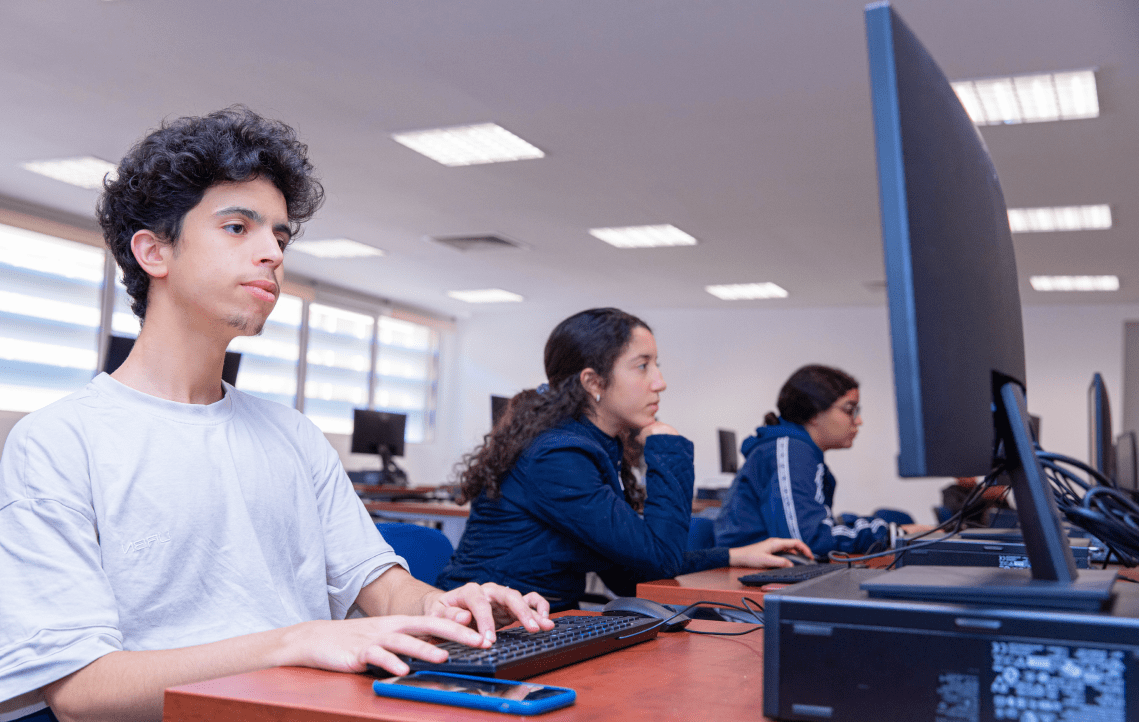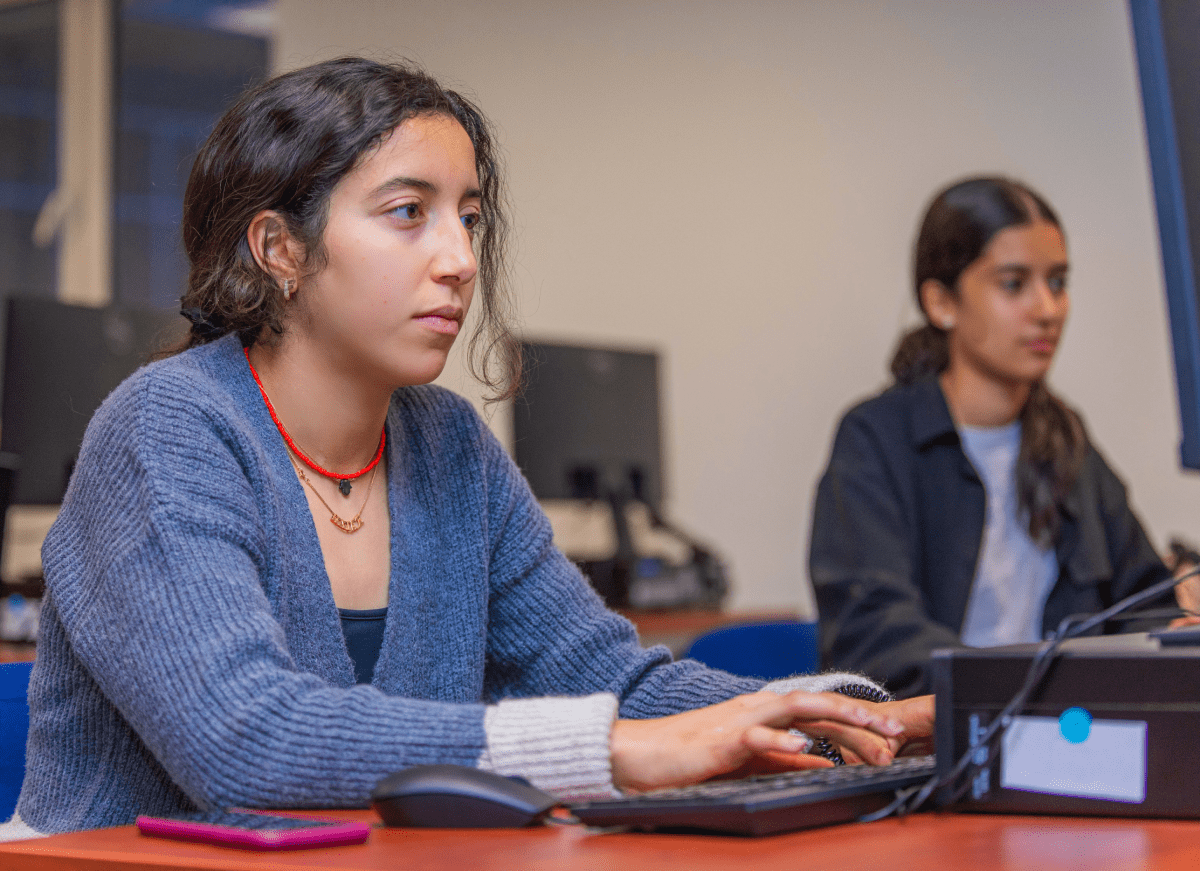Computer Science Engineering (Baccalaureate+5)

The UM6P College of Computing - School of Computer Science offers a top-level engineering program (Bac+5) specializing in digital technology.
Both theoretical and practical, this rigorous 5-year program offers world-class academic education led by internationally renowned professors and researchers, promoting research and innovation in computer science. The program aims to train highly skilled students and researchers in the field of digital technologies, focusing on 4 pillars:
- Highly selective admission, attracting the best baccalaureate graduates in Mathematics.
- A renowned faculty of research professors, authors of major international publications
- A strong network of partnerships with international universities and industry
- The innovation and research ecosystem of the Université Mohammed 6 Polytechnique
.png)
Pursuant to a high-level of training and a well-rounded curriculum, students will be able to tackle complex engineering situations involving multiple areas: scientific, technical, economic, ethical, and social.
Both theoretical and practical, this program of excellence consists of two integrated preparatory years followed by specialization cycles in various fields of computer science.
- Preparatory Cycle:
This course is tailored to:
- Provide a requisite foundation in mathematics, probability, and statistics for today's world of data science.
- Develop the necessary prerequisites in terms of fundamental concepts in computer science.
- Develop communication skills in English and French.
- Acquire the working methods and techniques essential for further study and professional development
- Engineering Cycle:
The main objective of the UM6P College of Computing – School of Computer Science engineering program is to train computer engineers in observing, identifying and modeling real-world problems. Engineers capable of participating in the study and implementation of large-scale digital projects. This training offers in-depth courses that cover a wide range of new trends in the digital field.
The thorough design of the course curriculum focuses on new technologies and ensures an optimal learning experience for students who wish to join leading IT companies, work on innovative digital projects in prestigious research laboratories or launch their own start-ups.
In addition to technical skills, students will also acquire soft skills (communication, group work and English) and business skills (innovation, entrepreneurship, project management, etc.) to interact effectively in their future work environments.

Pr. Ismail BERRADA
Ismail Berrada is an associate professor at the School of Computer Science of Mohammed VI Polytechnic University (UM6P College of Computing – School of Computer Science ). He has obtained:
- A graduate degree in computer engineering from ENSEIRB, INP Bordeaux, 2002.
- A postgraduate diploma (DEA) in parallel computing (HPC) from the University of Bordeaux 1, 2002.
- A PhD in computer science from the University of Bordeaux 1, 2005.
He has worked for several years as a lecturer at the University of La Rochelle and as an associate professor at the University Sidi Mohamed Ben Abdellah, Fez.
He has participated in several European projects: Erasmus + (E-val project, Satelit, ...), Tempus (Pa@lmes) Marie Curie (Tarot), ANR (Averroès, ...), as well as Moroccan academic and industrial projects (Move, Autoroute du Maroc, Ministry of Education, Ministry of Defense (National Defense Administration), an HPC core for USMBA, CMU-Africa,...).
His research is mainly focused on the application of AI techniques for Intelligent Transportation Systems (ITS), automatic processing of Arabic language and its dialects (NLP) in the context of social media mining (profiling, deception detection, sentiment analysis, humor, sarcasm, offensive language detection), and recently AI for cybersecurity (malware detection, URL Phishing, and IDS intrusion detection systems). His work has led to several publications in top conferences and journals (NAACL, SemEval, IEEE Trans ITS, ..)
Integrated Preparatory cycle (2 years) :
|
Year |
Semester |
Code |
Modules |
|
1st Year |
Semester 1 |
M1 |
Calculus I |
|
M2 |
Algebra I |
||
|
M3 |
Physics I (Mechanics) |
||
|
Physics I (Optics) |
|||
|
M4 |
Chemistry |
||
|
M5 |
Algorithmics I |
||
|
M6 |
Communication techniques and Sport |
||
|
Semester 2 |
M1 |
Calculus II |
|
|
M2 |
Algebra II |
||
|
M3 |
Computer Programming I |
||
|
M4 |
Physics II (Electromagnetism) |
||
|
Physics II (Thermodynamics) |
|||
|
M5 |
Algorithmics II |
||
|
M6 |
English I |
||
|
Sports |
|
Year |
Semester |
Code |
Modules |
|
2nd Year |
Semester 1 |
M1 |
Algebra III |
|
M2 |
Calculus III |
||
|
M3 |
Web Programming I |
||
|
M4 |
Modern Physics |
||
|
M5 |
Programming II |
||
|
M6 |
English II |
||
|
Sport |
|||
|
Semester 2 |
M1 |
Calculus IV |
|
|
M2 |
Introduction to Databases |
||
|
M3 |
Probability and Descriptive Statistics |
||
|
M4 |
Computer Architecture |
||
|
M5 |
Introduction to Entrepreneurship |
||
|
M6 |
History and Philosophy of Science |
Engineering Cycle (3 years) :
|
Year |
Modules |
||
|
1st Year |
Semester 1 |
M1 |
Communication 1 and Sport |
|
M2 |
English 1 |
||
|
M3 |
Introduction to Computation |
||
|
M4 |
Advanced Algorithm I |
||
|
M5 |
Advanced Programming I |
||
|
M6 |
Automata |
||
|
M7 |
Numerical Analysis |
||
|
Semester 2 |
M1 |
English 2 and internship |
|
|
M2 |
Logic |
||
|
M3 |
Advanced Algorithms II |
||
|
M4 |
Advanced Programming II |
||
|
M5 |
Probability and Statistics |
||
|
M6 |
Discrete Mathematics & Graph Theory |
||
|
M7 |
Introduction to communication systems |
||
|
M8 |
Application Project I |
|
Year |
Semester |
Code |
Modules |
|
2nd Year |
Semester 3 |
M1 |
Communication 2 and Sport |
|
M2 |
Information Theory & Signal |
||
|
M3 |
Computability Theory and Complexity |
||
|
M4 |
Operational Research |
||
|
M5 |
Operating Systems |
||
|
M6 |
Databases |
||
|
M7 |
Management I |
||
|
Semester 4 |
M1 |
Management II and internship |
|
|
M2 |
Compilers |
||
|
M3 |
Computer Networks |
||
|
M4 |
Artificial Intelligence |
||
|
M5 |
Concurrent and Distributed Computing |
||
|
M6 |
Big Data and Data Analysis |
||
|
M7 |
Wireless communication |
||
|
M8 |
Application Project II |
|
Year |
Semester |
Code |
Modules |
|
|
3rd Year |
Semester 5 |
M1 |
Embedded Systems |
|
|
M2 |
Cloud Computing |
|||
|
M3 |
Machine Learning |
|||
|
M4 |
Cryptography and Computer Security |
|||
|
M5 |
Software Engineering |
|||
|
M6 |
Web & Mobile applications |
|||
|
M7 |
Entrepreneurship & Startups |
|||
|
Semester 6 |
M1 |
Final Project Paper |
||
In a unique approach, Mohammed VI Polytechnic University implements an innovative teaching and research model based on experimentation. To this end, the university's sites are equipped with "Living Labs" dedicated to applied research. These laboratories are working and training platforms on a real scale (mining installations, experimental farms, factories, cities...) and are open to the scientific community and to students.
The UM6P College of Computing has access to the most powerful Data Center on the African continent. The entire infrastructure, with its high-performance servers and high-capacity storage, plays a central role in digital transformation and fosters the emergence of a digital ecosystem. It is a space that helps students, researchers and startups develop and test prototypes of their products and services.
Our demanding supervision will allow you to carry out your academic project and integrate the largest national and international research centers within the framework of a thesis, a project setup or integrating the public or private sectors as:
- Software Engineer
- Data Scientist
- Computer Hardware Engineer
- IT Project Manager
- Network Architect
- Computer scientist
- Data Engineer
- Cyber Security Engineer
- Systems Architect
- AI Engineer
- Database administrator
Entry requirements:
- Hold a High School degree (Baccalaureate) in one of the following series: Mathematics A and B, Physical Sciences, Mission Baccalaureate, or equivalent.
- Obtain a "Très bien" mention with top grades in mathematics
- Be under 21 years of age as of September 1st
Accessing the integrated preparatory classes involves four stages:
- Application: Students holding a high school diploma or candidates for a high school diploma in the specified fields who wish to apply to College of Computing - School of Computer Science must complete an online registration on https://www.um6p.ma/apply website within the specified deadlines.
- Pre-selection: Candidate pre-selection is conducted based on merit, considering the candidate's academic record.
- Written Test: Pre-selected candidates are required to take the mathematics test.
- Personality Interviews: Candidates who pass the written test are then interviewed to establish the final selection list.
Subject to availability, College of Computing - School of Computer Science organizes a selection process for students who meet the pre-selection criteria. Candidates wishing to apply for the engineering program are invited to visit https://cc.um6p.ma/ to learn about the conditions and access procedures for the current academic year.
In line with their societal commitment, Mohammed VI Polytechnic University and the Ibn Rochd Foundation for Science and Innovation are committed to supporting meritorious students who do not have the necessary personal resources by partially or totally covering their living expenses (housing/restaurant) and by partially or totally waiving their tuition fees. Do not hesitate to contact us for more information.
_1.png)

